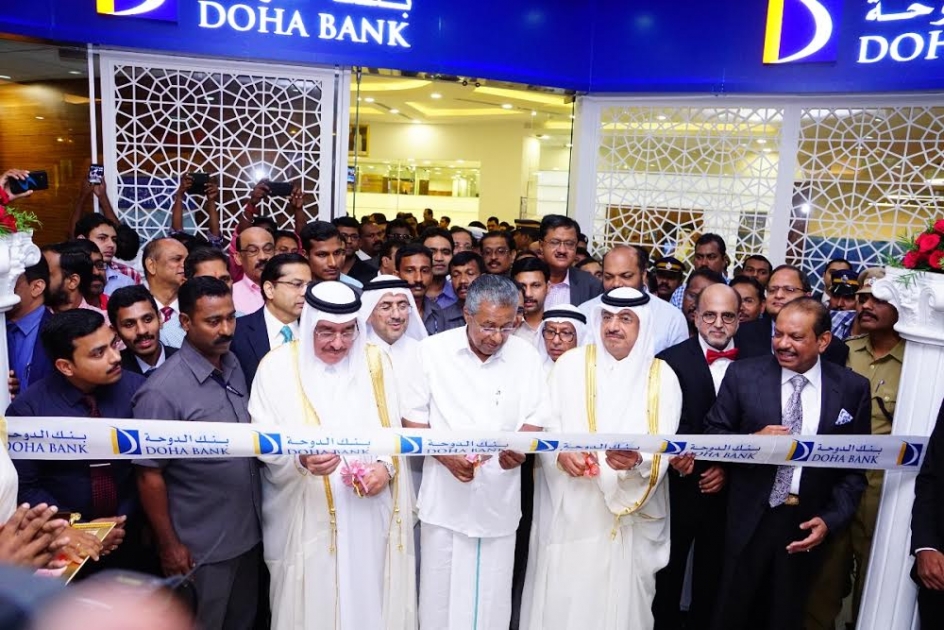
CM Inaugurates Doha Bank Kochi Branch at Lulu Mall
Chief Minister Pinarayi Vijayan inaugurated the Kochi Branch of Doha Bank at Lulu International Shopping Mall in Edapally. M. A. Yusufali, Managing Director, Lulu Group International; Sheikh Fahad bin Mohammad Bin Jabor Al Thani, Chairman, Doha Bank; Sheikh Abdul Rehman bin Mohammad Bin Jabor Al Thani, Managing Director, Doha Bank; Board members of Doha Bank, executive management, senior Kerala government officials, digniataries from Qatar and prominent local corporates who have business interests in the GCC and across the globe were present on the occasion. As part of the inauguration an investors conference on “Kerala-Qatar Investment Opportunities“ was also held, which witnessed participation of major investors and SMEs from Kerala and GCC and Doha Bank officials.
Dr. R. Seetharaman, CEO, Doha Bank, who spoke on the occasion gave insight on various issues including global economy, global investment, Indian economy, industrial development in Kerala and GCC’s bilateral relations with India. “The IMF July 2016 outlook had revised global growth down to 3.1 percent in 2016, mainly on account of Brexit concerns. The outlook has worsened for advanced economies to 1.8 percent in 2016 while it remains at 4.1 percent for emerging market and developing economies. In an environment of anemic growth, the global economy faces pronounced risks, including a slowdown in major emerging markets, sharp changes in financial market sentiment, stagnation in advanced economies and struggle in revival of commodity prices,” he said.
“According to UNCTAD, Global Foreign Direct Investment (FDI) flows rose in 2015 arose by 36% to reach an estimated US$ 1.7 trillion. FDI flows to developed countries in 2015 reached at US$ 936 billion. Developing economies saw their FDI reaching US$ 741 billion. Flows to transition economies continued to fall to US$ 22bn as tumbling international commodities prices and regional conflicts undercut FDI. FDI inflows into India exceeded $55 billion in the financial year that ended in March 2016,” Dr. Seetharaman said.
He said, “Indian economy is expected to grow by 7.4 percent in 2016-17. The drop in oil price could ease the pressure on India’s current account deficit and fiscal deficit. India’s Consumer prices rose 6.07 percent from a year earlier in July 2016.India had cleared the Goods and Services Tax (GST) bill recently and expects it to be fully implemented by April 1st 2017.”
“Kerala has aimed at an average growth rate 9.5% in 2016-17. Its strategic location on the trans-national trade corridor, rich natural resources, and simple and transparent procedures make the state favourably suited for investments in major sectors such as tourism, IT/ITeS, manufacturing and mining. Rs. 5,000 crore has been allotted for infrastructure projects in the recent state budget. The SmartCity project in Kochi is expected to be completed by 2020.The State Tourism Department is developing eco-friendly, rural tourism packages in Kumarakom, Wayanad, Kovalam and Muziris heritage circuit. The electronic hub proposed at Kochi is a prestigious project of the Government of Kerala to promote electronic hardware manufacturing and assembling units and research and development (R&D) centers, and to support infrastructure for the same.”
Dr. R. Seetharaman highlighted on Qatar economy and major bilateral relationships with India. He said “Qatar economy expected to rise by 3.9% in 2016. Construction is expected to lead growth in 2016 and is projected to expand by 9.9%. GCC – India bilateral trade is close to $100bn in 2015-16 out of which Qatar- India bilateral trade is close to $10bn. There is a large market for Qatar’s LNG, oil and petrochemical sectors in India. In Dec 2015 RasGas Company and Petronet LNG Limited have entered into a binding sale and purchase agreement (SPA) for the supply of an additional one million tons per annum of LNG to India starting in 2016. RasGas delivered a liquefied natural gas cargo to India’s Petronet at its new LNG Terminal located in Kochi. In May 2013 Qatar bought a 5% stake in Indian telecom company Bharti Airtel Ltd for $1.26bn. Many Indian Companies such as L&T, Tata Projects, Voltas and Punj Lloyd have been actively participating in the various projects in Qatar.”
Dr. Seetharaman also highlighted the significant contribution of the SME sector in GCC. He said “In UAE SMEs contribute to over 60 per cent of the GDP and provide around 86 per cent of the employment in the private sector. SMEs can participate in Qatar’s non- hydrocarbon diversification. Kerala has identified various SME clusters for its development. SMEs are from sectors such as food processing industry, handlooms, textiles and garments, rubber, wood-based industries, Ayurveda and herbal & cosmetics. Kerala’s SME and IT sectors can contribute to its economic growth better,” he added.



























